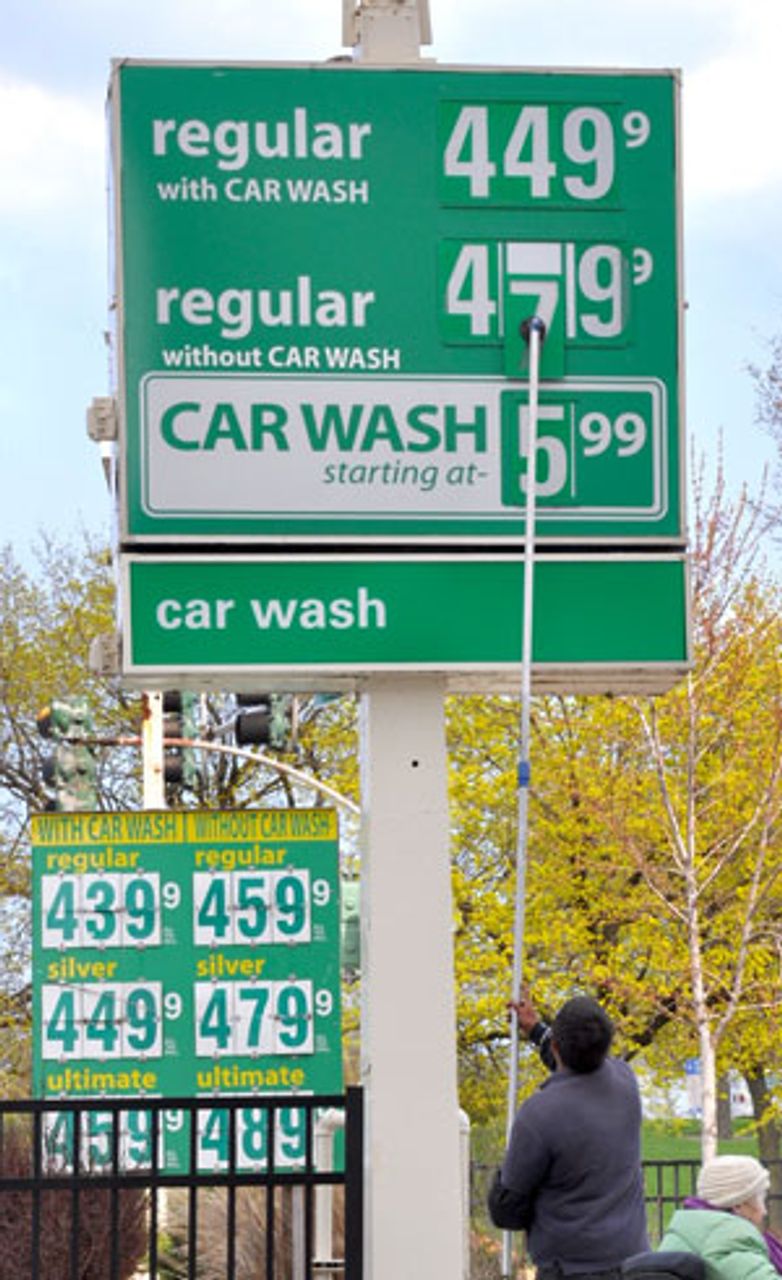 Prices being changed in Chicago
Prices being changed in Chicago Gasoline prices in the US have risen an average of 25 percent over the last three months. Prices in major metropolitan areas have increased by approximately 33 percent in the same time frame. While the national average is currently just under $4.00 per gallon, most metropolitan areas are well over that.
Over the last weekend, the World Socialist Web Site interviewed motorists at filling stations in urban areas across the US.
Pittsburgh, Pennsylvania
Prices at the pump are currently close $4.00/gallon.
Ron Johnson: “These prices are ridiculous. They are really hurting people. I drive 18 miles each way. I have a small car, but with sitting in traffic I use 2 gallons a day. That is an extra $20.00 a week, just to get back and forth to work. When you add in the other driving around that is $40 a week. That might not sound like a lot, but by the time you pay your bills, the gas, the electric, rent, clothes for me and my kids, we don’t have a lot of money left. So that extra $40 is money that has to come from food or buying things for my kids.
“These politicians don’t care about us. I voted for Obama, I was really excited about him winning the elections. But what has he done? This country is a mess. He didn’t make it, it was there when he came in, but he is like all the others—take it out on the poor. They give all this money to the banks and bail them out, then they say they can’t tax the rich. But $40 extra for gas a week, that is like a tax on the poor.”
Rebeca Coin: “I am so tired of seeing the price go up. Unless you work downtown you can’t really take a bus. With all the cuts in transit, it would take an hour and a half for me to get to work, which is a 20 minute drive. If they don’t want people to drive they should be spending more on public transportation, not less.
“I read last week that Exxon made $10 billion in profits, in just three months. They use any excuse to raise prices. I think they are doing this deliberately to hurt the country. We are trying to get out of this depression, and this is going to hurt a lot of people. A lot of people will lose their jobs because people will have less to spend. People can’t afford to spend $60 and $80 every time they need to fill their tank.”
Chicago, Illinois
Prices in Chicago are among the highest in the country, at $4.50 per gallon.
Terri is a postal worker who works in Chicago and lives on the border of Illinois and Indiana. She pays $140 per week for gas. “These gas prices are too high. I don’t think it’s fair. We have to decide whether we’re going to put gas in our car to get to work or buy groceries. You still make the same amount of money, and food prices have gone up ... and they [gas companies] are making a lot of money.”
 Nelson Velazquez
Nelson VelazquezNelson Velazquez, a teacher in Elgin: “It’s very high, just ridiculous. Forget it, I’m just putting in $25 today... Thank God I have a job.”
Rock Island, Illinois
Wendy: “The gas prices stink. At least I am not in Chicago [where gas prices are in the $4.50 range]. I was going to Iowa where gas is slightly cheaper, but my tank was empty and I had to come here. My husband and I have thought about car pooling, but it’s hard with two jobs in different places. I have no hope in sight that gas prices will go down either. What can we do? I have to buy gas to go to work and get from place to place. I have a new, small car [a relatively fuel efficient Honda Civic] and had to put in $30 with only a three-fourths tank filled. I used to fill it up to full all the time.”
Julie lives in Illinois and works at ALCOA in Iowa: “These prices are awful and are costing us a lot of money. We have two cars to fill in our household and we have teenagers. These high prices cut into everything else we normally can afford, and I really hope it doesn’t keep going up. I have to drive 15 miles to and from work every day. My boys are in sports activities and after-school activities. I can’t just ride my bike to work either; it’s too dangerous and there are no bike paths.”
John, a young man, drives a GM truck: “If gas prices go up to $5, I will have to find a way to car pool. I’m not really sure how most people are going to be able to manage.”
Art, a music teacher of 33 years from the greater Chicago area: “I think we should stop subsidizing the gas companies. They’re doing fine, making huge profits. It’s time for the speculation to stop. It’s killing the middle class. It’s already affecting how I can spend money on other things, including non-work related travel. All this financial speculation and gambling on Wall Street is killing the American people.”
Detroit, Michigan
 Bud Davenport and his wife
Bud Davenport and his wifeBud Davenport: “I own a trucking company. You can imagine, if we’re paying $4.19 for gas, I’m paying $4.50 a gallon for diesel at 300 gallons per fill-up. So to fill my truck up it’s costing $1,300. I have three trucks. I carry cars. It’s really eating into my pocket.
“It’s expected to rise to six dollars a gallon . . . that’s completely unacceptable. You know, people have to choose nowadays whether they’re going to put gas in their car or eat … or pay for heat in the winter.
“It’s driving up the cost of food. The price of a loaf of bread is four dollars! It was a dollar-ninety-nine, a dollar fifty, but now its four bucks for a loaf of bread; everything is up. And most of it is fuel. Fuel! Nothing, regardless of what it is, gets here without calculating fuel costs. You’re talking trains, trucks. It has to get delivered. Prices need to be regulated. People need to know that no matter how bad times get, its not going to go beyond that cap.
“Is it going to happen? No. But it should.”
 Ormia Washington
Ormia WashingtonOrmia Washington is a senior at Oak Park High School: “Just yesterday it was $4.09. Now it’s $4.29. The thing is, the sign says $4.19, but the pump says $4.29—for regular! It’s changing so fast they don’t even change the sign!
“The rich make all the decisions and everything, but we as the lower class, we deal with it. I’m going to buy a bike."
A professional woman pumping gas in Oak Park: “These prices mean I’m not going to be traveling as much. We usually take a couple of family trips, go see my kids who are all out of state. I won’t be doing it as much.
“I have staff who make maybe $9.50-10 dollars an hour, who come from Detroit or the east side. They’re not working. They won’t come. They won’t work for two hours. It’s not worth it for them to get the few hours because their entire wages are going to pay gas. So it is affecting businesses as well. They need to do something. They need to put a cap on it.”
Los Angeles, California
 Kanisha
KanishaKanisha: “I would really love to know what exactly is causing the gas prices to go up. This is what the oil companies do. The hard working consumer usually has to bear the brunt of the higher ups making decisions basically for themselves. I pretty much have to be affected by the gas prices because of what someone else is saying. As an average American, it doesn’t matter what my opinion is.”
 Victor
VictorVictor: “It’s affecting me a lot. I have a very long commute each day to drop my children at school and then go on to work. Monday through Friday I do this.
“I think it’s still the same as when Bush was in office. He’s [Obama] not doing very much. Nothing has changed. Gas is going up, there’s another war. Just Monday, I put gas in the tank and it was $4.13 and today it’s $4.20. I hope something happens to make the prices go down, but I don’t see that happening with Obama. I don’t see him doing anything about it.”
Santa Barbara, California
 Matt Humphry
Matt HumphryMatt Humphry, UCSB student: “Some of my friends have to pay $60, $70 to fill their tanks. People are becoming more conservative about how they use their car. Driving a lot less.
“I heard about the oil companies making record profits. Every year gas prices keep going up and the companies keep making record profits. If they are getting so much money, they should be doing something to help lower prices. Something is not right.”
When asked about turning gas companies into publicly owned utilities under the democratic control of the working class, he said, “I’m all for it. If it help lower prices, I say go for it."
